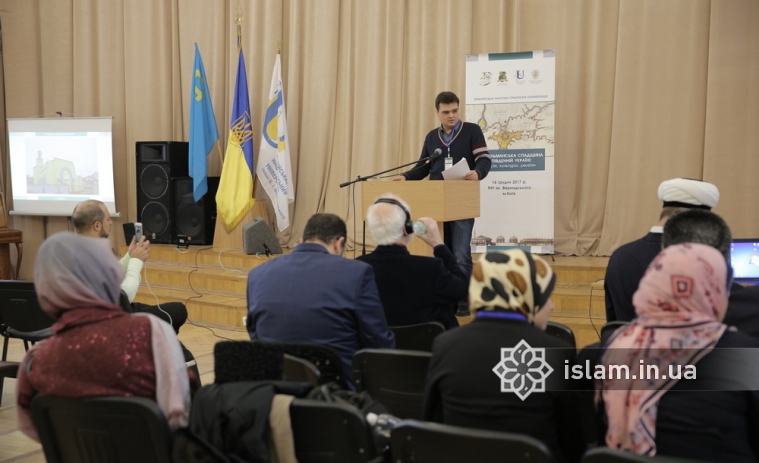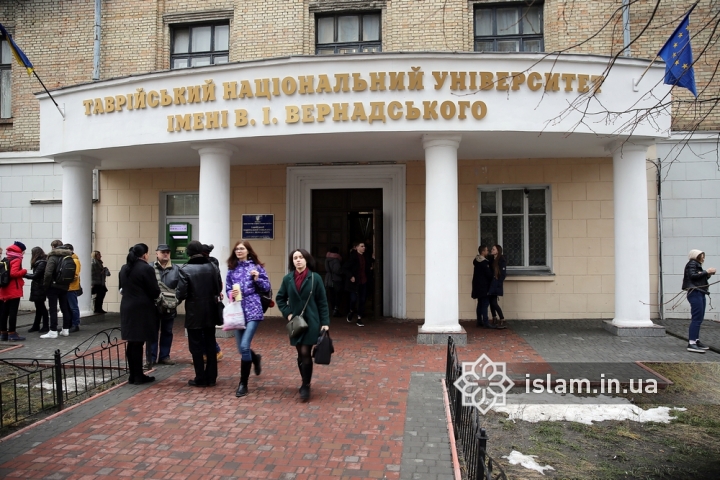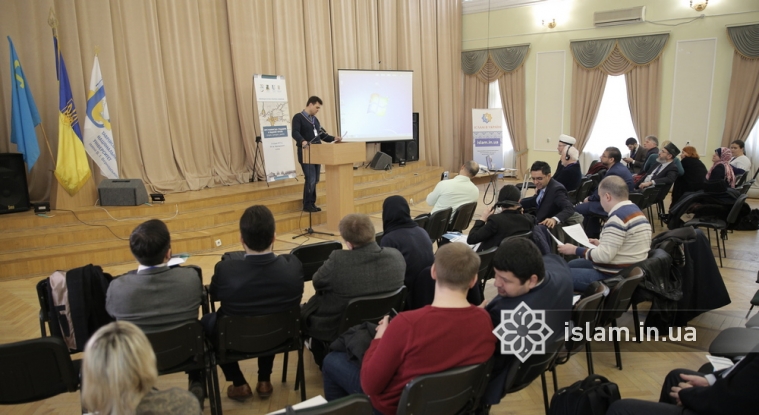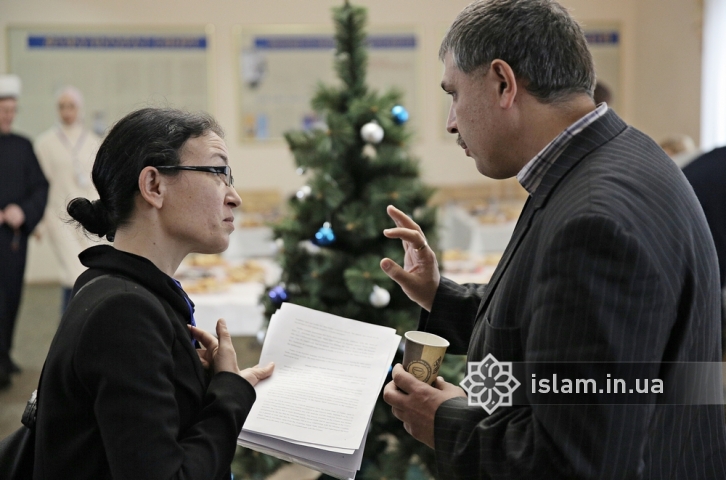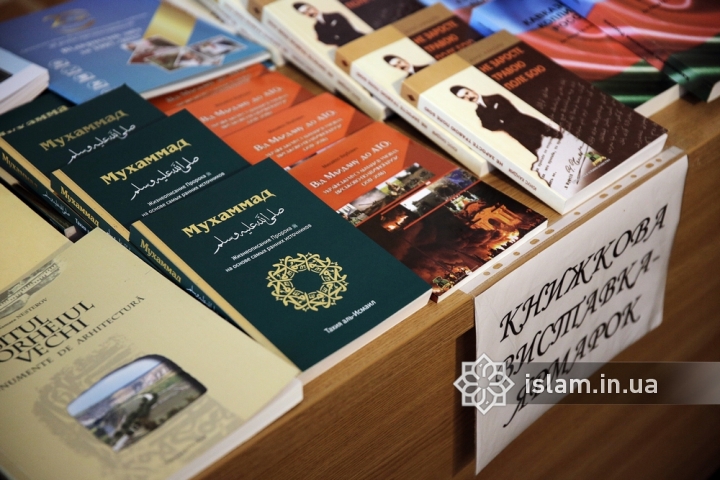An important event for theologists and religious studies experts, philosophers, historians, sociologists, representatives of religious and social organisations gathered in Kyiv on 14 December. Volodymyr Vernadskii Tavrian National University hosted the International Research-to-Practice Conference “Muslim Heritage in Southern Ukraine: History, Culture and Religion”, which brought together specialists from not only all around Ukraine, but from Turkey, Moldova and Belarus.
That remarkable event was organized and held by Ukrainian Centre for Islamic Studies, Centre of Islamic Studies of the National University “Ostroh Academy”, Association “Alraid” and Volodymyr Vernadskii Tavrian National University.
Almost two dozens of scientific reconnaissance in the matter of the main topic were presented to the honourable audience during the three sessions, namely “Islam in the history of Crimea and Crimean Tatars”, “Islam on the continental Ukraine”, and “Ukrainian Islam in terms of international ties”. The organizer intentionally avoided separating those sections in different locations, so that every participant would be able to hear each report and participate in its discussion.
The privilege of greeting the participants and charging them to fruitful work was given to Mufti of Religious Administration of muslims of Ukraine “Umma” Said Ismagilov, Recturer of the Tavrian National University Volodymyr Karazin, Head of SCU All-Ukrainian Association “Alraid” Seyran Aryfov and Ukrainian diplomat Yurii Kochubey.
Volodymyr Karazin, in particular, stressed that Ukrainian history was incomprehensible without acknowledging its oriental roots during different periods:
— Half of the Ukrainian history is, of course, linked with Slavonic culture, European traditions and contacts, which are also to be researched and closely studied, for we were limited in doing that in the previous years. But still, a large part of our culture is linked with the East, and we are well aware that the earliest sources about Kyiv Rus were Arab sources, — reminded the recturer.
The Headmaster stressed, that the words about importance of that conference weren’t just a figure of speech:
— This event, in particular, is a reminder of the history of Tavrian National University, where Volodymyr Vernadskiy and his friends opened the Oriental Faculty in 1918, and it was a wise thing to do in Crimea, steeped in Muslim, Islamic, oriental culture; where many great scholars had worked. Creating the Oriental Faculty was a tribute to them and a desire to continue that tradition.
The recturer also reminded that after the World War II, when the University resumed its operation (under the title of Crimean Pedagogical Institute), every Faculty was restored except for the Oriental, which the Soviet authorities never allowed to re-launch.
— That prohibition of restoration of the Oriental Faculty was making it clear that there’s no East remaining here (after the Crimean Tatars’ total deportation, - ed.), so there was no need for further Oriental studies.
Mr.Karazin also told that there were numerous attempts to restart the Oriental faculty up to the collapse of the Soviet Union, but they were never successful.
— I’m happy that in the Independent Ukraine, we launched a Crimean Tatar, Turkish and Arab department, which brought us to restoration of the Oriental Faculty.
Volodymyr Karazin also promised to do everything he could in order to launch regular Orientalists Congress under the auspices of the University, which was, “in particular, to remind Ukraine of its history and traditions that were for some reasons forgotten.”
Seyran Aryfov, Head of the All-Ukrainian Association “Alraid”, started his speech with thanking God Almighty for the organizers being able to gather specialists from different cities and countries in one room having noted that researching the past is never a waste of effort:
— It’s an open secret that all the world’s processes, all the great perturbations have, no doubt, their reasons in the past. The same goes for Ukraine: we live in a troubled moment, and it certainly has its reasons in the past, not perhaps the recent history, but the hoar of innumerable ages. That is why the topic of the conference was chosen. By researching our past, we gain a better understanding of the current events, particularly in the field of interfaith and interconfessional relations, — noted Mr.Aryfov.
Mufti of RAMU “Umma” Said Ismagilov, who is also the Head of the Ukrainian Centre for Islamic Studies, greeted the participants and stressed the symbolism of holding the conference at Travian National University. He expressed his hope for further fruitful cooperation with the University.
Speaking about the topic of the conference itself, the Ukrainian Muslim leader stressed that the Ukrainian Muslim history and heritage had long been out of both te textbooks and research programmes, despite the fact that powerful Muslim countries operated on Ukrainian soil, from the Golden Horde to the Crimean Khanate and the Ottoman Empire:
— Ukraine, being situated on the crossroads of civilizations, cultures and religions, has always been in the middle between Christianity and Islam, which was bound to have a great impact on mentality, culture and overall Ukrainian heritage. So we need to be impartial and research the input of every civilization in the phenomenon we now know as modern Ukraine.
An ovation was given to Yurii Kochbei, a prominent researcher and diplomat, greeted the gathering in Ukrainian and Turkish, on behalf of the National Academy Of Science Antagenel Krymskiy Institute of Oriental Studies. He stressed that Ukrainians and Crimean Tatars are able to return Crimea and all its heritage when united, and must do exactly that.
— It’s a fact of little importance what this heritage is, is it Cristian, Antique or Muslim (indeed, the Muslim heritage prevails). And in order to get it back, we must act with the utmost stretch of our powers [....]. That is the only way to dispel all those myths that were force fed to us, and live on normally in our independent Ukrainian State.
The event was moderated by Mykhailo Yakubovych, the famous Ukrainian historian, orientalist and translator (and also the author of full Ukrainian translation of the meanings of the Holy Qur’an). Besides that, he also presented his research on the experience of academic studies of history of Islam in Ukraine.
The first particular conference session was opened by a world-known historian, philologist and Arabist, Professor Mehmet Maksudoglu cast discredit on the very term “Ottoman Empire”, for almost 50 years of research have turned the world famous historian and Arab philologist to thinking that the wrong term was used due to the lack of possibility to give adequate interpretation of the country’s title “Ottoman State”, which is the closest translation possible. In contemporary Ottoman Turkish language, the state was called “The Glorious and Splendid Sultanate of Ottomans”, and it terms of European traditional naming one would better use “Ottoman State”.
Thus, the researcher believes that using the term “Ottoman Empire” is incorrect, for it didn’t have such necessary indications of an Empire as exploitation of colonies. That had rather been a policy of protection and guardianship of Muslims all over the world and justice for non-Muslims.
Noteworthy, Professor Maksudoglu (who taught at various Universities around the world, from Cambridge to Marmara) is of Crimean Tatar origin.
Overall, there were many interesting presentations during the conference, which to be published in one collection in the nearest future.
The list of speakers and topics included “Ukrainian-born Ottoman Reformist Alemdar Mustafa Bairaktar” by Ali Nuriev (Turkey); “Desired or undesired: narratives of reversion to Islam in XVII century Crimea” by Firat Yasha (Turkey); “From trade to religious incitements: merchants-missionaries in XIII-XV century Crimea” by Emel Kilic (Turkey); “On some peculiarities of demographic changes in late XVIII century Crimea” by Teimur Ataev (Azerbaijan); “Balkans, the crossroad of religions” by Lefter Georgi (Moldova); “Crimean Khanate and Belarus: shaping the tatar community” by Zoryna Kanapatska (Belarus); “Tolerance of the Crimean Khans” by Gulnara Bekirova (Ukraine); “Ukraine-Turkey relations” by Buraq Chakyshkan (Turkey); “Shahin Giray as the first experience of modernization in Islamic world” by Grigorii Mavrov (Turkey); “Khan Adil Girey I dealings with Hetman Petro Doroshenko” by Taras Chukhlib, etc.
After the conference, Sheikh Said Ismagilov noted that presentations of foreign guests were particularly interesting:
— It’s always interesting to see Ukraine and our history through the foreign researchers’ eyes, for instance, the researchers from Turkey, Moldova, Belarus and Azerbaijan. It occurs that things we take for granted, as indisputable facts, are not facts for them at all, for their sources are different. The Turkish professor strongly disagrees that the Ottoman Empire has been, in fact, an Empire; a researcher from Azerbaijan has a totally different view on the evitions of Crimean Urums and Armenians; people in modern Belarus know nothing about the vast repressions against the Crimean Tatars on the peninsula, for their news only show plots on Russia’s “great achievements” and “improving life here and now”.
Sheikh Said added that “We can’t, of course, agree with all that, but knowing exactly how people and researchers of some country see us is quite useful and interesting”.

